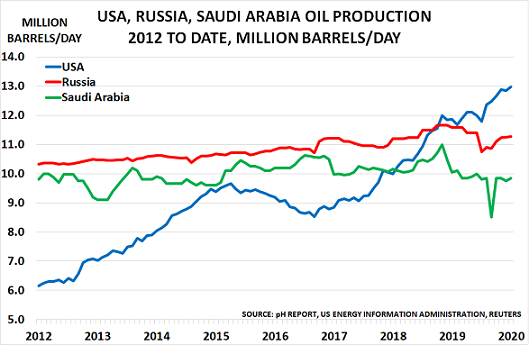Oil Markets Hit Perfect Storm As Coronavirus Cuts Demand

Former Saudi Oil Minister Sheikh Yamani’s warning in 2000 looks increasingly prophetic today:
“30 years from now, there will be a huge amount of oil – and no buyers. 30 years from now, there is no problem with oil. The Stone Age did not end because the world ran out of stones, and the Oil Age will not end because we run out of oil. I am a Saudi and I know we will have serious economic difficulties ahead of us.”
“As King Faisal said in 1974, “In one generation we went from riding camels to riding Cadillacs. The way we are wasting money, I fear the next generation will be riding camels again”.“
Everything that could go wrong, is now going wrong for oil producers. As the International Energy Agency reports:
“Global oil demand has been hit hard by coronavirus and the widespread shutdown of China’s economy. Demand is now expected to fall by 435 kb/d in Q1, the first quarterly contraction in more than 10 years.”
China and India have been the main source of demand growth over the past decade, and their economies are now clearly struggling. China’s battle with coronavirus has had a terrible impact on oil demand, as Reuters reports:
- Overall, China’s oil product demand is expected to fall by a third in Q1
- China is also ramping up oil product exports due to the downturn in domestic demand
- International banks have suspended $600m in credit lines to 3 independent Chinese refiners
In turn, as Saudi Oil Minister Prince Abdulaziz confirmed, coronavirus presents a major challenge to the OPEC cartel:
“When your house is on fire, you can either treat it with a garden hose and risk losing the building, or call the fire brigade.”
Remarkably, many on Wall Street still seem to believe in a V-shaped recovery from the coronavirus epidemic. But in reality, the demand picture may well get worse before it gets better, as other major oil consumers including S. Korea, Japan and Italy are now suffering from the virus.
Equally important, as the chart shows, oil prices have finally broken out of the ‘flag shape’ that has been building for years, as I last discussed in November:
“It’s been a long journey for the ‘flag’, stretching back to the pre-Crisis peaks at nearly $150/bbl in the summer of 2008. And the bottom of the flag was made back in 2016, after the last collapse from 2014’s peak of $115/bbl .”

The supply position is also not following the story laid out by the hedge funds. They had bought 533mb of oil in Q4, assuming that OPEC+ Russia would happily reduce output to support prices.
But in reality, as the chart shows, Russian output hit a record post-Soviet era high in 2019. And at December’s OPEC+ meeting, it was allowed to increase condensate output outside the quota – making thoughts of a cutback even more notional.
The funds have also been disappointed by the failure of US shale output to collapse:
- Contrary to the views of the “experts” they used, shale oil output is continuing to rise
- What they missed was that the major oil companies are now involved
- These have the cash and the expertise to overcome problems as they develop
So as always, Saudi Arabia has been left to carry the main burden of the cuts.
Saudi has had indirect support from the reduction in Iranian and Venezuelan output as a result of sanctions, along with the current reduction in Libyan output. But clearly the risks are rising for a collapse of the cartel, as happened in 1985 and temporarily in 2015.
Brent prices (BNO) above $60/bbl were based on the idea of a perfect world – where OPEC+ cuts and a synchronised global upturn would fuel demand; the US-China trade war would end; and sustainability concerns would disappear. None of this looks likely today
And as Sheikh Yamani presciently warned, the Oil Age will not end because we run out of oil. Unless OPEC+ prove able to make really deep cuts in output at this week’s meeting, oil prices seem highly likely to soon be back at their long-term average, below $30/bbl.
At this point, OPEC countries may regret that they didn’t diversify their economies whilst the oil money was still rolling in.
Disclosure: I wrote this article myself, and it expresses my own opinions. I am not receiving compensation for it. I have no business relationship with any company whose stock is mentioned in this ...
more


